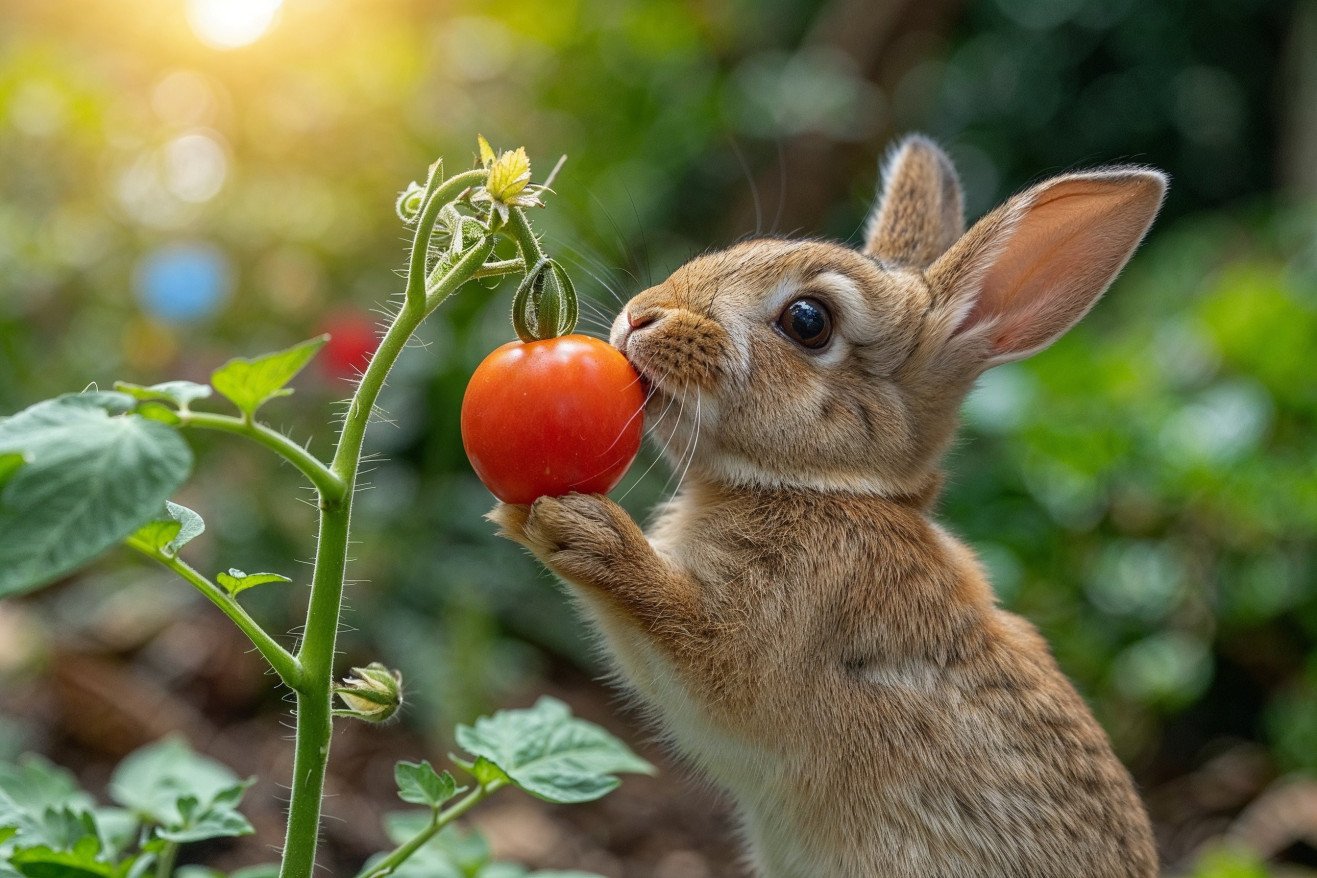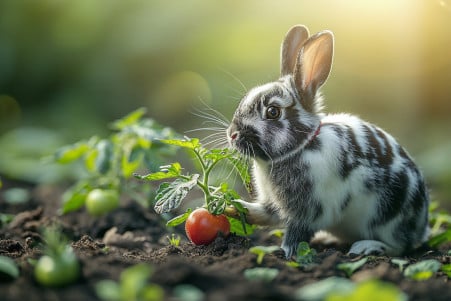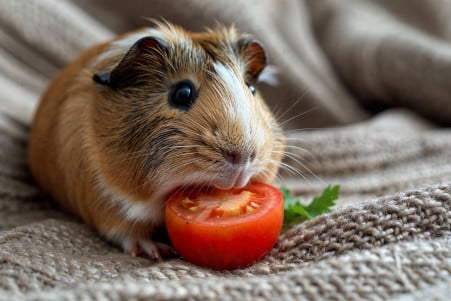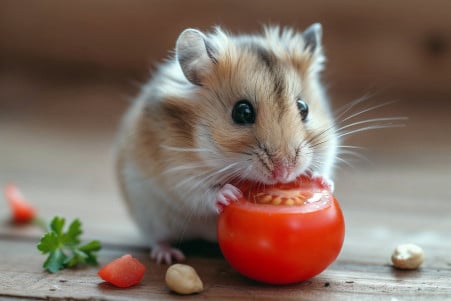Can Rabbits Eat Tomatoes? A Guide to Safe Feeding Practices
20 January 2024 • Updated 28 January 2024

While tomatoes are a popular food for people, can rabbits eat them too? Yes, rabbits can eat tomatoes as a treat, but there are some important things to keep in mind. For example, the leaves and stems of the tomato plant are toxic to rabbits, and the fruit should be cut into small pieces and washed before being fed to your pet.
In addition, tomatoes should not be used to replace high-fiber foods like hay in a rabbit’s diet.
To help you make sure your rabbit eats tomatoes in a way that’s safe, we’ve looked at a range of research and expert recommendations. From what veterinarians say about the nutritional value of tomatoes and the potential downsides of feeding them to rabbits, to the most recent studies on how tomatoes affect rabbits’ digestion, our evidence-based analysis covers everything you need to know about giving your rabbit tomatoes.
You’ll find out not just how to feed tomatoes safely but also how to make sure you’re meeting your rabbit’s broader nutritional requirements.
Can rabbits eat tomatoes?
How to Keep Your Rabbit Safe From Tomato Toxicity
While tomatoes can be a tasty snack for rabbits, it’s important to be aware of the toxic elements found in certain parts of the plant. According to Gardening Know How, the nightshade family that tomatoes are a part of contains the toxic alkaloid tomatine, which is most highly concentrated in the green parts of the plant, including the leaves, stems, and unripened fruit.
While ripe tomatoes contain lower levels of tomatine, if a rabbit eats too many of them, it can cause digestive upset and other health problems.
Medical Xpress explains that tomatine is a natural defense mechanism that plants use to protect themselves from pests and diseases. Unfortunately, when rabbits eat these parts of the plant, they can be toxic. To keep your pets safe, make sure to avoid feeding them the green parts of the tomato plant and only give them ripe, red tomatoes.
If rabbits have eaten toxic parts of the plant, they may exhibit signs of toxicity, including but not limited to, lethargy, loss of appetite, and digestive upset.
If you think your rabbit has eaten toxic parts of a tomato plant, make sure to take them to the vet right away.
By feeding rabbits tomatoes in moderation and making sure to prepare them properly, you can minimize the risk of toxicity and ensure that the positives outweigh the negatives.
Nutritional Benefits of Tomatoes for Rabbits
Tomatoes have a number of nutrients that can be helpful for rabbits if they are given in the right amounts. Elwan’s research in the Journal of Animal Physiology and Animal Nutrition found that tomato powder has a positive impact on rabbit growth and health parameters.
This is due to the vitamins, minerals, and antioxidants found in tomatoes. As noted in the journal Animals, the antioxidants lycopene and beta-carotenoids in tomato pomace are important for reducing oxidative stress and improving the health of rabbits.
That said, it’s also important to note that tomatoes have a high sugar content. While this isn’t a problem in moderation, too much sugar can lead to obesity and other health problems in rabbits. This is why it’s important to make sure that rabbits are only given tomatoes as an occasional treat.
Because of the potential benefits and the need for moderation, rabbits should only be given tomatoes a few times a week and in small amounts. This is in line with the nutritional benefits of tomatoes in a rabbit’s diet, which should be used to supplement their other foods, not replace them.
By understanding the importance of portion size and frequency, rabbit owners can make sure that their pets get the nutritional benefits of tomatoes without any negative side effects.
Tomatoes in a Rabbit’s Diet
In addition to the flavor that tomatoes can add, they are also less important than the mainstays of a rabbit’s diet. As the RSPCA points out, rabbits should eat mostly hay and fresh grass, which is important for their digestion and dental health. Tomatoes, like other fruits and vegetables, should be fed in limited quantities as treats because of their sugar content, which can cause health problems if fed in excess.
Because of this, tomatoes should be added to a rabbit’s diet in moderation. VCA Animal Hospitals suggests that owners feed tomatoes with other vegetables to make sure that rabbits are getting a variety of nutrients. This can include feeding small pieces of tomato with leafy greens like romaine lettuce or herbs that are part of the daily recommended fresh food intake.
However, it’s important to note that while tomatoes can provide vitamins and hydration, they can’t replace the high-fiber, high-volume grazing that rabbits get from eating hay, as nidirect explains.
So while a few pieces of tomato can be a nice treat, rabbits should be fed a diet that’s mostly hay with a small selection of other vegetables and the occasional piece of fruit. This will help ensure that a rabbit’s diet supports their sensitive digestive system and overall health.
Studies of Tomatoes and Rabbit Health
While the research on the impact of tomatoes on rabbits is limited, the studies that have been conducted provide some important information for rabbit owners. For example, in a study published on ResearchGate, S. M. Zahran found that rabbits’ performance or carcass traits were not negatively impacted by diets containing up to 20% dry tomato pomace (DTP).
In fact, rabbits fed a diet containing 15% DTP had better weight gain than those in other groups, indicating that the careful inclusion of tomato by-products in their diet could help them grow.
Meanwhile, other research, such as a study outlined on ScienceDirect, has looked at the effect of supplementing rabbit diets with tomato pomace on the quality of rabbit meat. The study found that adding up to 6% tomato pomace to the rabbits’ diet improved the quality of the meat without impacting the rabbits’ carcass characteristics.
In addition, the study found that the fatty acid profile of the meat was improved by the addition of tomato pomace, with the ratio of unsaturated to saturated fatty acids increasing, which is healthier for human consumption.
These results suggest that tomato pomace could be a useful supplement in rabbit diets, but they also show that it’s important to use it in moderation. Rabbit owners can use this information to improve their pets’ diets, but they should do so carefully, making sure that while some of the components of tomatoes may be helpful, they don’t replace the important parts of a rabbit’s diet.
As more research is conducted, our knowledge of the impact of tomatoes on rabbit health will likely grow, allowing for more specific recommendations.
How to Feed Tomatoes to Your Rabbit
Make sure you’re feeding tomatoes to your rabbit in a way that’s safe and healthy by following these simple but important steps. First, make sure you’re using ripe, organic tomatoes to avoid any chemicals or GMOs, as recommended by A-Z Animals.
Then, rinse the tomato thoroughly under cold water to remove any pesticides or other impurities. Finally, make sure you remove the entire stem and any leaves, as they contain solanine, a toxic substance that can be dangerous to rabbits in large amounts, according to Small Pet Select.
Here’s a quick rundown of what to do and what not to do:
- Do feed tomatoes in moderation—no more than a grape-sized piece once a day, according to A-Z Animals.
- Don’t feed the vine, leaves, or seeds of the tomato plant.
- Do cut the tomato into small, rabbit-sized pieces to avoid choking hazards.
- Don’t feed tomatoes every day; they’re high in sugar and should be a special treat.
Watch your rabbit for any signs of digestive issues, such as gas, bloat, or diarrhea. If you notice any of these symptoms, contact your vet right away. You can also mix things up by feeding your rabbit other low-sugar veggies or herbs as treats to make sure they’re getting a well-rounded diet.
Most importantly, make sure your rabbit always has access to fresh, clean water and plenty of hay, which should be the main staple of their diet. This will help ensure your rabbit stays healthy and happy, and that they can enjoy the occasional tomato without any negative side effects.
Summary
Tomatoes can be a healthy treat for rabbits, but it’s important to feed them to your pet in a way that ensures they are safe and healthy. This means feeding tomatoes in moderation, feeding only the ripe fruit and not the leaves or stems, and preparing them properly by washing and removing the seeds.
While tomatoes are not a necessary part of a rabbit’s diet, they can be a healthy addition when fed in the right way. They can provide vitamins, hydration, and antioxidants, but they should never replace essential foods like hay, which is important for a rabbit’s digestive health.
Rabbit owners should always be mindful and careful when feeding their pets, especially when introducing new foods. Being aware of the importance of a varied diet and portion control is important for the health of your pets.
Ongoing studies will continue to inform our understanding, but it’s already clear that the information we have is important for the health and happiness of pet rabbits, and it helps us better understand their dietary needs and the role of tomatoes within them.


